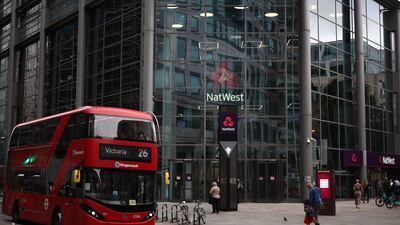Every morning at breakfast, the City banker would tell me the latest.
We were staying in the same hotel in Greece and being an early riser, and glued to Bloomberg and the markets news, he would wander over to our table to fill me in.
Inevitably, given what was occurring, it was about Nigel Farage and the ex-Ukip leader’s running spat with Coutts and the bank’s NatWest parent. Frequently, he wanted to express his anger at the latest twist.
Now back in London, in the City quietened by people away on holiday or using August and the slacker period as an excuse for extended WFH, there is also considerable dismay and frustration.
What’s powering the backlash is twofold: that having taken the decision to ditch him as a client, Farage is apparently in talks with Coutts to retain his account; and that the populist crowd rouser has formed an anti-banking website.
In truth, the bankers and regulators don’t know how to handle someone like Farage, which is why Coutts’ original move to turn away his custom was so ill-conceived – it was always going to end terribly.
Yes, Farage may not have fitted with the bank’s heightened woke values but there are plenty of folk still with Coutts accounts who don’t either. Others expelled don’t know how to rebel or to galvanise a revolution as he can. Ironically, it’s that point, which rebounded so spectacularly on Coutts: the ever-so elitist (as it sees itself) private bank did not want the association with him.
Even if there was an issue with his ability to meet their criteria of holding £1 million in investments or loans or £3 million in savings – and that seems open to doubt – the act of shutting Farage down was bound to provoke a ferocious response. Add to that the bank’s incredibly cack-handed compilation of a 40-page dossier on his previous utterings and actions, coupled with the NatWest chief executive’s discussion, however vague, about his financial affairs with a BBC reporter, and it was game, set and match to the professional slayer of the Establishment.
The result, apart from senior heads rolling at NatWest and Coutts and the group chairman’s ordering of an inquiry by a City law firm, which will be followed by the financial regulator’s own review, is the destruction, as many bankers see it, of their historical secrecy and a brake on their
Banks close thousands of accounts a year with scarcely a murmur. Now, thanks to the Farage farrago, customers are aware they can make use of what was hitherto an obscure tool under data protection legislation, of the formal Subject Access Request or SAR, to find out what the bank is holding on them. That’s how he discovered the 40-page report; that’s how, going forward, banks can expect to be swamped with similar requests.
Suddenly, you get a picture of bank staff urgently reviewing all the personal details they’ve gathered and deleting like mad.
By law, UK banks are not meant to shut accounts or deny services solely because of someone’s political ideology. Likewise, they are allowed, indeed legally required, to bar customers they suspect of money laundering.
The problem exists in the middle, regarding Politically Exposed Persons or PEPs. These are people who hold or have held public office and therefore may be more susceptible to bribery or corruption. The Financial Conduct Authority requires the banks to apply extra diligence to them, to raise the bar as to establishing the sources of their wealth.
Examples would include heads of state, politicians, senior members of the armed forces, judges, board members of central banks. In fact, there is no definitive list, and it includes not only them but family members and close associates. It was meant to cover kleptocrats, organised crime groups, terrorists, as an extra barrier to the washing of dirty money, but application of the regulations is blurry and the banks are allowed pretty much free licence.
The difficulty is they have become so nervous about their corporate reputations, anxious not to be outed by campaigners, that in some cases, they’ve allowed fear to take over. This has resulted in them applying their own values, which are at odds with those of clients.
Accompanied with this is the persistent widespread feeling that the banks and their bosses never paid the price for causing the crisis of 2008
So, anyone they regard as ‘extreme’ or likely to attract negative publicity from any quarter can be dragged in. Since Farage launched his attack, other well-known figures have come forward to say that they, too, have had trouble finding a bank.
Since banks were on the Remain side during the toxic EU debate, this has led to accusations they’re seeking revenge on Brexiteers. As the last few years have illustrated, the hangover from that turbulent period still lingers – those identified with either side of the dispute love to attach blame and labels. So, the banks are regarded as coming down heavily against those who persuaded the country to leave the EU – something Brexit-supporters and their friends in the media are publicly relishing.
Accompanied with this is the persistent widespread feeling that the banks and their bosses never paid the price for causing the crisis of 2008. This, and the taxpayer-funded bailout, followed by government austerity measures, makes them in the eyes of many a ready target.
Add to that, branch closures, high charges, slowness to pass on increases in interest rates to depositors and thumping profits, and they’re public enemy number one.
No one has a good word to say for them. No politician of any persuasion will speak on their behalf, the press sees them as fair game – they are there to be kicked mercilessly.
Allied to that is their own crass PR. They might be run by intelligent executives but too often these same chieftains lack empathy.
The upshot is the banks must reform how they conduct themselves, how they speak, what they say. They should look in the mirror and ask how they’re seen. Crucially, instead of being superior about it and falling back on management-speak and procedure, which translates to gobbledygook, they ought to embrace the society they’re part of and put themselves in the position of the consumer. Not easy, when you’re able to hide behind high-security doors and complex money matters and you’re earning mega-sums.
It should have been done long ago. As they’re finding out, via Farage, they no longer have a choice.
THE SPECS
Cadillac XT6 2020 Premium Luxury
Engine: 3.6L V-6
Transmission: nine-speed automatic
Power: 310hp
Torque: 367Nm
Price: Dh280,000
The candidates
Dr Ayham Ammora, scientist and business executive
Ali Azeem, business leader
Tony Booth, professor of education
Lord Browne, former BP chief executive
Dr Mohamed El-Erian, economist
Professor Wyn Evans, astrophysicist
Dr Mark Mann, scientist
Gina MIller, anti-Brexit campaigner
Lord Smith, former Cabinet minister
Sandi Toksvig, broadcaster
SPECS
%3Cp%3E%3Cstrong%3EEngine%3A%3C%2Fstrong%3E%201.5-litre%204-cylinder%3Cbr%3E%3Cstrong%3EPower%3A%3C%2Fstrong%3E%20101hp%3Cbr%3E%3Cstrong%3ETorque%3A%3C%2Fstrong%3E%20135Nm%3Cbr%3E%3Cstrong%3ETransmission%3C%2Fstrong%3E%3A%20Six-speed%20auto%3Cbr%3E%3Cstrong%3EPrice%3A%3C%2Fstrong%3E%20From%20Dh79%2C900%3Cbr%3E%3Cstrong%3EOn%20sale%3A%3C%2Fstrong%3E%20Now%3C%2Fp%3E%0A
US Industrial Market figures, Q1 2017
Vacancy Rate 5.4%
Markets With Positive Absorption 85.7 per cent
New Supply 55 million sq ft
New Supply to Inventory 0.4 per cent
Under Construction 198.2 million sq ft
(Source: Colliers)
Breaking News: The Remaking of Journalism and Why It Matters Now
Alan Rushbridger, Canongate
MATCH INFO
Al Jazira 3 (O Abdulrahman 43', Kenno 82', Mabkhout 90 4')
Al Ain 1 (Laba 39')
Red cards: Bandar Al Ahbabi (Al Ain)
The Specs:
The Specs:
Engine: 2.9-litre, V6 twin-turbo
Transmission: 8-speed automatic
Power: 444bhp
Torque: 600Nm
Price: AED 356,580 incl VAT
On sale: now.
Living in...
This article is part of a guide on where to live in the UAE. Our reporters will profile some of the country’s most desirable districts, provide an estimate of rental prices and introduce you to some of the residents who call each area home.
Desert Warrior
Starring: Anthony Mackie, Aiysha Hart, Ben Kingsley
Director: Rupert Wyatt
Rating: 3/5
'Ashkal'
%3Cp%3E%3Cstrong%3EDirector%3A%3C%2Fstrong%3E%20Youssef%20Chebbi%3C%2Fp%3E%0A%3Cp%3E%3Cstrong%3EStars%3A%3C%2Fstrong%3E%20Fatma%20Oussaifi%20and%20Mohamed%20Houcine%20Grayaa%3C%2Fp%3E%0A%3Cp%3E%3Cstrong%3ERating%3A%3C%2Fstrong%3E%204%2F5%3C%2Fp%3E%0A
AI traffic lights to ease congestion at seven points to Sheikh Zayed bin Sultan Street
The seven points are:
Shakhbout bin Sultan Street
Dhafeer Street
Hadbat Al Ghubainah Street (outbound)
Salama bint Butti Street
Al Dhafra Street
Rabdan Street
Umm Yifina Street exit (inbound)
Landfill in numbers
• Landfill gas is composed of 50 per cent methane
• Methane is 28 times more harmful than Co2 in terms of global warming
• 11 million total tonnes of waste are being generated annually in Abu Dhabi
• 18,000 tonnes per year of hazardous and medical waste is produced in Abu Dhabi emirate per year
• 20,000 litres of cooking oil produced in Abu Dhabi’s cafeterias and restaurants every day is thrown away
• 50 per cent of Abu Dhabi’s waste is from construction and demolition
The five new places of worship
Church of South Indian Parish
St Andrew's Church Mussaffah branch
St Andrew's Church Al Ain branch
St John's Baptist Church, Ruwais
Church of the Virgin Mary and St Paul the Apostle, Ruwais
Match info
Liverpool 3
Hoedt (10' og), Matip (21'), Salah (45 3')
Southampton 0
More on Quran memorisation:
More from Neighbourhood Watch:
More from Rashmee Roshan Lall
Global state-owned investor ranking by size
|
1.
|
United States
|
|
2.
|
China
|
|
3.
|
UAE
|
|
4.
|
Japan
|
|
5
|
Norway
|
|
6.
|
Canada
|
|
7.
|
Singapore
|
|
8.
|
Australia
|
|
9.
|
Saudi Arabia
|
|
10.
|
South Korea
|
About Okadoc
Date started: Okadoc, 2018
Founder/CEO: Fodhil Benturquia
Based: Dubai, UAE
Sector: Healthcare
Size: (employees/revenue) 40 staff; undisclosed revenues recording “double-digit” monthly growth
Funding stage: Series B fundraising round to conclude in February
Investors: Undisclosed
more from Janine di Giovanni
The five pillars of Islam
The five stages of early child’s play
From Dubai-based clinical psychologist Daniella Salazar:
1. Solitary Play: This is where Infants and toddlers start to play on their own without seeming to notice the people around them. This is the beginning of play.
2. Onlooker play: This occurs where the toddler enjoys watching other people play. There doesn’t necessarily need to be any effort to begin play. They are learning how to imitate behaviours from others. This type of play may also appear in children who are more shy and introverted.
3. Parallel Play: This generally starts when children begin playing side-by-side without any interaction. Even though they aren’t physically interacting they are paying attention to each other. This is the beginning of the desire to be with other children.
4. Associative Play: At around age four or five, children become more interested in each other than in toys and begin to interact more. In this stage children start asking questions and talking about the different activities they are engaging in. They realise they have similar goals in play such as building a tower or playing with cars.
5. Social Play: In this stage children are starting to socialise more. They begin to share ideas and follow certain rules in a game. They slowly learn the definition of teamwork. They get to engage in basic social skills and interests begin to lead social interactions.
Ten tax points to be aware of in 2026
1. Domestic VAT refund amendments: request your refund within five years
If a business does not apply for the refund on time, they lose their credit.
2. E-invoicing in the UAE
Businesses should continue preparing for the implementation of e-invoicing in the UAE, with 2026 a preparation and transition period ahead of phased mandatory adoption.
3. More tax audits
Tax authorities are increasingly using data already available across multiple filings to identify audit risks.
4. More beneficial VAT and excise tax penalty regime
Tax disputes are expected to become more frequent and more structured, with clearer administrative objection and appeal processes. The UAE has adopted a new penalty regime for VAT and excise disputes, which now mirrors the penalty regime for corporate tax.
5. Greater emphasis on statutory audit
There is a greater need for the accuracy of financial statements. The International Financial Reporting Standards standards need to be strictly adhered to and, as a result, the quality of the audits will need to increase.
6. Further transfer pricing enforcement
Transfer pricing enforcement, which refers to the practice of establishing prices for internal transactions between related entities, is expected to broaden in scope. The UAE will shortly open the possibility to negotiate advance pricing agreements, or essentially rulings for transfer pricing purposes.
7. Limited time periods for audits
Recent amendments also introduce a default five-year limitation period for tax audits and assessments, subject to specific statutory exceptions. While the standard audit and assessment period is five years, this may be extended to up to 15 years in cases involving fraud or tax evasion.
8. Pillar 2 implementation
Many multinational groups will begin to feel the practical effect of the Domestic Minimum Top-Up Tax (DMTT), the UAE's implementation of the OECD’s global minimum tax under Pillar 2. While the rules apply for financial years starting on or after January 1, 2025, it is 2026 that marks the transition to an operational phase.
9. Reduced compliance obligations for imported goods and services
Businesses that apply the reverse-charge mechanism for VAT purposes in the UAE may benefit from reduced compliance obligations.
10. Substance and CbC reporting focus
Tax authorities are expected to continue strengthening the enforcement of economic substance and Country-by-Country (CbC) reporting frameworks. In the UAE, these regimes are increasingly being used as risk-assessment tools, providing tax authorities with a comprehensive view of multinational groups’ global footprints and enabling them to assess whether profits are aligned with real economic activity.
Contributed by Thomas Vanhee and Hend Rashwan, Aurifer
SCHEDULE
Saturday, April 20: 11am to 7pm - Abu Dhabi World Jiu-Jitsu Festival and Para jiu-jitsu.
Sunday, April 21: 11am to 6pm - Abu Dhabi World Youth (female) Jiu-Jitsu Championship.
Monday, April 22: 11am to 6pm - Abu Dhabi World Youth (male) Jiu-Jitsu Championship.
Tuesday, April 23: 11am-6pm Abu Dhabi World Masters Jiu-Jitsu Championship.
Wednesday, April 24: 11am-6pm Abu Dhabi World Professional Jiu-Jitsu Championship.
Thursday, April 25: 11am-5pm Abu Dhabi World Professional Jiu-Jitsu Championship.
Friday, April 26: 3pm to 6pm Finals of the Abu Dhabi World Professional Jiu-Jitsu Championship.
Saturday, April 27: 4pm and 8pm awards ceremony.
Asia%20Cup%202022
%3Cp%3E%3Cstrong%3EWhat%3C%2Fstrong%3E%3Cbr%3EAsia%20Cup%20final%3A%20Sri%20Lanka%20v%20Pakistan%3Cbr%3E%3Cbr%3E%3Cstrong%3EWhen%20%3C%2Fstrong%3E%3Cbr%3ESunday%2C%20September%2011%2C%20from%206pm%3Cbr%3E%3Cbr%3E%3Cstrong%3EWhere%3C%2Fstrong%3E%3Cbr%3EDubai%20International%20Stadium%3Cbr%3E%3Cbr%3E%3Cstrong%3EHow%20to%20watch%3C%2Fstrong%3E%3Cbr%3ECatch%20the%20live%20action%20on%20Starzplay%20across%20Mena%20region.%26nbsp%3B%3C%2Fp%3E%0A
More from Neighbourhood Watch
The specs
Engine: 4.0-litre flat-six
Torque: 450Nm at 6,100rpm
Transmission: 7-speed PDK auto or 6-speed manual
Fuel economy, combined: 13.8L/100km
On sale: Available to order now




